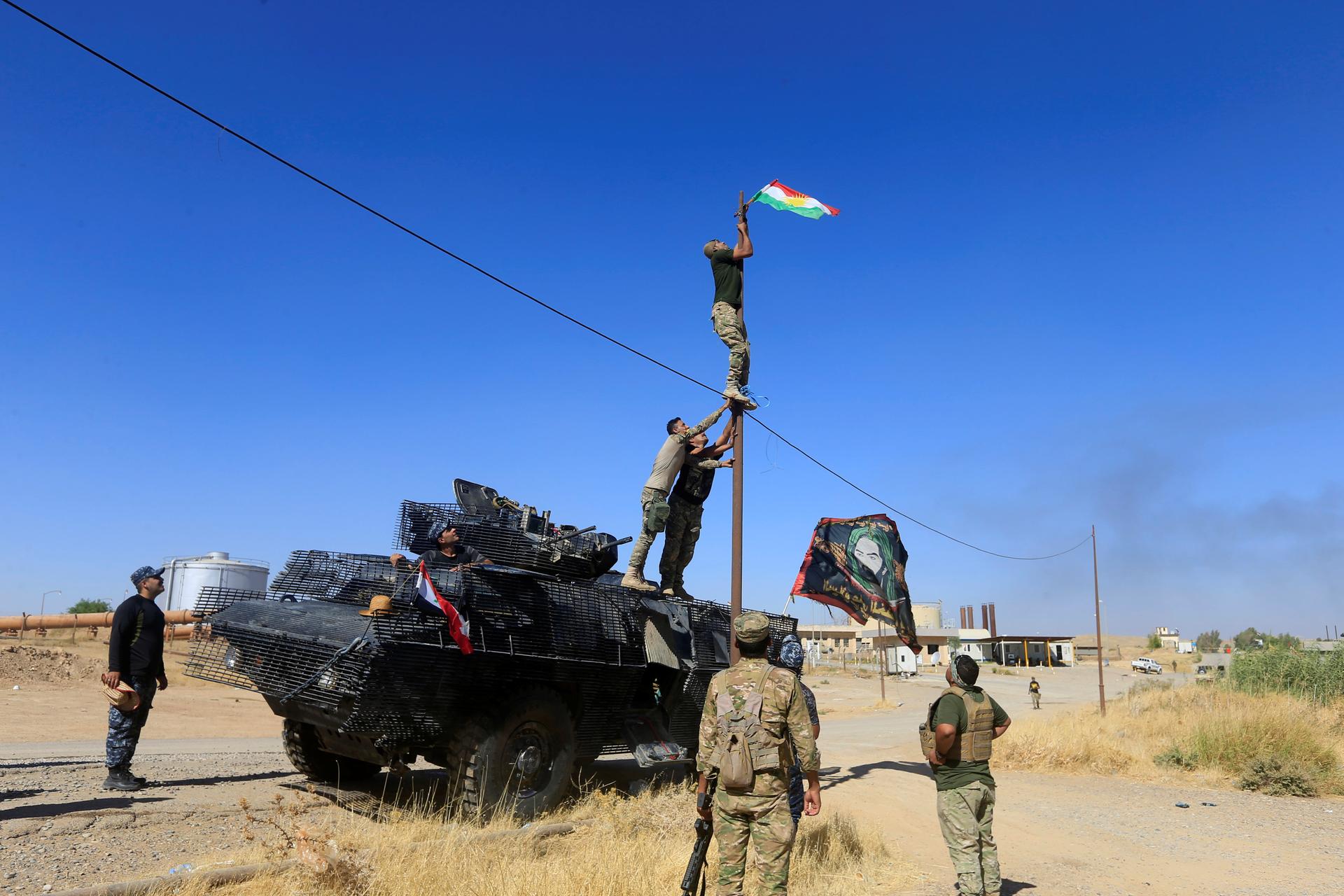A member of Iraqi security forces takes down a Kurdish flag in Dibis on the outskirts of Kirkuk, Iraq, Oct. 17, 2017.
It was exactly one year ago today when Kurdish Peshmerga forces launched an offensive against ISIS in villages in the outlying areas of Mosul to pave the way for the Iraqi army to enter the city. I was there.
The night before the offensive, I was trying to catch some sleep but despite two coats and a sleeping bag, the cold made me shiver all night. Part of the reason for the sleeplessness was wondering what would happen next, now that the Kurdish army had joined the Iraqi army in a joint operation.
Now that the Iraqi army and Shiite militia have taken Kirkuk from the Kurds and caused hundreds of Kurdish and Sunni families to flee, all the fear and reservation comes back to me. Many Kurds kept saying that the Kurdish Peshmerga should stay out of the Mosul offensive and definitely away from making any deals with the Iraqi army.
“The Iraqi army can’t be trusted, and they’ll come for us after they’re done with ISIS,” ordinary Kurds feared.
Now that bitter prediction has come true after the Iraqis took over Kirkuk on Monday. They threw away the flag of Kurdistan and any sign of Kurdish sacrifice for that city’s stability and peace.
One may ask why the Kurds helped the Iraqi army against ISIS. The answer is the US told them to. American leaders made a deal between the Kurds and the Iraqis for a joint operation against ISIS. The Obama administration was so desperate for victory against ISIS that they sped up the offensive and made all kinds of promises to the Kurds, such as the Kurds getting to keep areas they occupied, as long as they led the offensive against ISIS and let Iraqi troops pass through Kurdish-controlled territories.
But now, the US is nowhere to be seen when Iraqi soldiers march on Kurds. The US spent billions of dollars on the Iraqi army for the fight against ISIS and terrorist groups, in general, in addition to supplying it with all kinds of armored vehicles, tanks and machine guns. Unfortunately, that equipment is now being used against the Kurds. How could American leaders, Republicans or Democrats, explain to their people the posters of Shiite clerics and sectarian banners on American-supplied Humvees and tanks used in the domestic war in Iraq? That’s what is happening in Iraq today. Abrams tanks and Humvees are adorned with sectarian flags and used to terrorize entire civilian populations.
When the Iraqi army and militia marched into Kirkuk on Monday, millions of Kurds in Kurdistan and around the world spent a sleepless 24 hours. All the US did was release a statement saying the White House was concerned and was monitoring the situation. That’s just about the most useless thing a country like the United States could say. People’s lives hang in the balance. Monitoring the situation doesn’t do anyone any good. President Donald Trump said the US was not taking sides.
No one has asked him to take sides. Kurds and Sunnis alike say the US should play a mediating role, and tell the Iraqis not to use their weapons on the Kurds and/or to further expand their operations. That is the least the US could do.
Having covered Iraq and its wars for a number of years, I know how easily and quickly a small war can get out of control and destroy thousand-year-old cities and uproot ancient communities. Washington is rightly concerned about finishing the war with ISIS, but in the meantime, it should make sure the Iraqis finish that war first before launching a new one, and not against the Kurds, who are and have been one of America’s best allies in the Middle East.
Ayub Nuri is a Canadian Kurdish journalist and the editor-in-chief of Rudaw English. His new book is "Being Kurdish in a Hostile World" (2017).
Our coverage reaches millions each week, but only a small fraction of listeners contribute to sustain our program. We still need 224 more people to donate $100 or $10/monthly to unlock our $67,000 match. Will you help us get there today?
